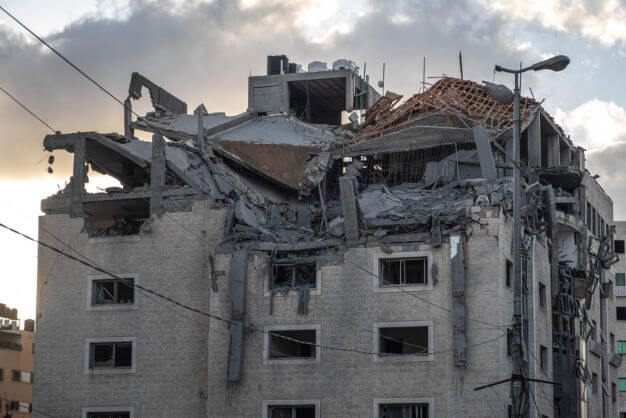
After weeks of Israeli airstrikes, Palestinian journalist Marah Elwadiya travels outside of the Gaza strip for the first time in her life. She and her colleagues are going to Egypt to process the trauma from a distance. Photo: Marah Elwadiya
“Journalism is my life”
Despite overwhelming obstacles, independent journalists in Palestine continue to provide critical information to the public and the world about the conditions in the country. Marah Elwadiya from Gaza is one of them
Marah Elwadiya has been employed by NAWA, a feminist online media outlet run by IMS’ partner Filastiniyat, for the past seven years. From a very young age, she knew that she wanted to fight for a better future for Palestinians.
“I have never felt like I’ve had a normal childhood; instead, I grew up witnessing intrusions and attacks, killings and violence. It has made me feel like I have a duty to act,” she explains. As she grew older, her method of choice became journalism: “The conditions of my country made me want to have a voice, to share it widely and make the world aware of what is being done to Palestinians.”
A challenging track
Becoming a journalist in Palestine is not straight forward. Due to the Israeli occupation and its restrictions, local journalists don’t have access to the same resources, training and knowledge exchanges as the rest of the world.
“You can receive some theoretical education in Palestine, but not much practical. My colleagues and I have all relied heavily on a learning-by-doing approach, by simply going out there and reporting.”
This is, however, not an approach without challenges, especially in a country where safety is often an issue and a wrong choice can have dire consequences. Marah Elwadiya had to learn difficult aspects of the work through practice: for example, how to improve your safety as a reporter when facing military aggression and how to navigate an interview with parents who have just found their child dead after a missile attack.
“I’ve had to figure out a lot of the ethical and practical aspects of working as a journalist on my own. I’ve had to consider whether including a picture of this child in the ruins covered in blood is the right thing to do – and if so, what kind of permission would I need to get from the parents?” she says. She was later introduced to Filastinyat after discovering that the organisation offered relevant training activities.
Attacks against independent media
In May 2021, Israel’s decades-long illegal occupation turned increasingly hostile and resulted in a two-week violent conflict. Marah Elwadiya’s husband is a news photographer, and he was out in the streets covering the developments while she cared for their small child in their apartment. She covered the developments in Gaza from their home, conducting interviews over the phone and gathering information available online. Simultaneously, Israeli missiles were dropping around her.
“I was very scared during those days for our safety. Filastiniyat was very understanding. If our situation allowed us to work, then that was okay with them. If not, then that was just as okay,” she says.

Shortly after the Israeli military aggressions started, Marah Elwadiya received a message that she, at first, refused to believe. She trawled the internet for information until she found photos of a destroyed, smoking building that she recognised: Filastiniyat’s office. Several media outlets had had their premises bombed by Israeli missiles. Now Filastiniyat had been hit, too.
“I was just completely in shock. I couldn’t pick up my phone or talk to anyone about it. This office was not just a workspace – it was my second home. It was a safe, inclusive and nurturing environment. And now it had been destroyed,” she recalls.
Much-needed support in trying times
Filastiniyat responded to the situation with care for Marah Elwadiya and her colleagues. Following the Israeli attacks on Palestine, they provided psychosocial support for their staff and other journalists. They organised recreational activities centred on stress relief as well as 12 group therapy sessions for 190 journalists.
A special initiative was to bring the staff to Egypt to process the traumas from a distance. To Marah Elwadiya, this was the experience of a lifetime: “I’m 31 years old, and for the first time ever in my life, I left the 365 square kilometres that make up the Gaza Strip. I’ve never been in a car or bus for more than two hours because that is how long it takes to go from one end to the other. I’ve never seen airplanes that were not the occupation’s bomb flights. But now I’m accessing a whole different world from Gaza.”
Going forward
Today, Filastiniyat has a new office and Marah Elwadiya is as motivated as ever. When asked what keeps her going, she has a clear answer: “Journalism is my life, not just my profession. It is the path that I’ve chosen and love. I dream of becoming a conflict reporter. And I dream of more investments and capacity building of Palestinians as a way to support us to one day break the siege.”
This article was published in IMS’ Annual Report 2021
PROGRAMME FACTS
Filastiniyat is a proactive, independent media advocacy organisation. NAWA was launched in 2012 as an online platform that supports freelance women journalists in their work and highlight women’s perspectives, focusing not only on women’s issues and stories but creating a space for all marginalised voices. The emergency efforts were funded by SIDA UNESCO.




